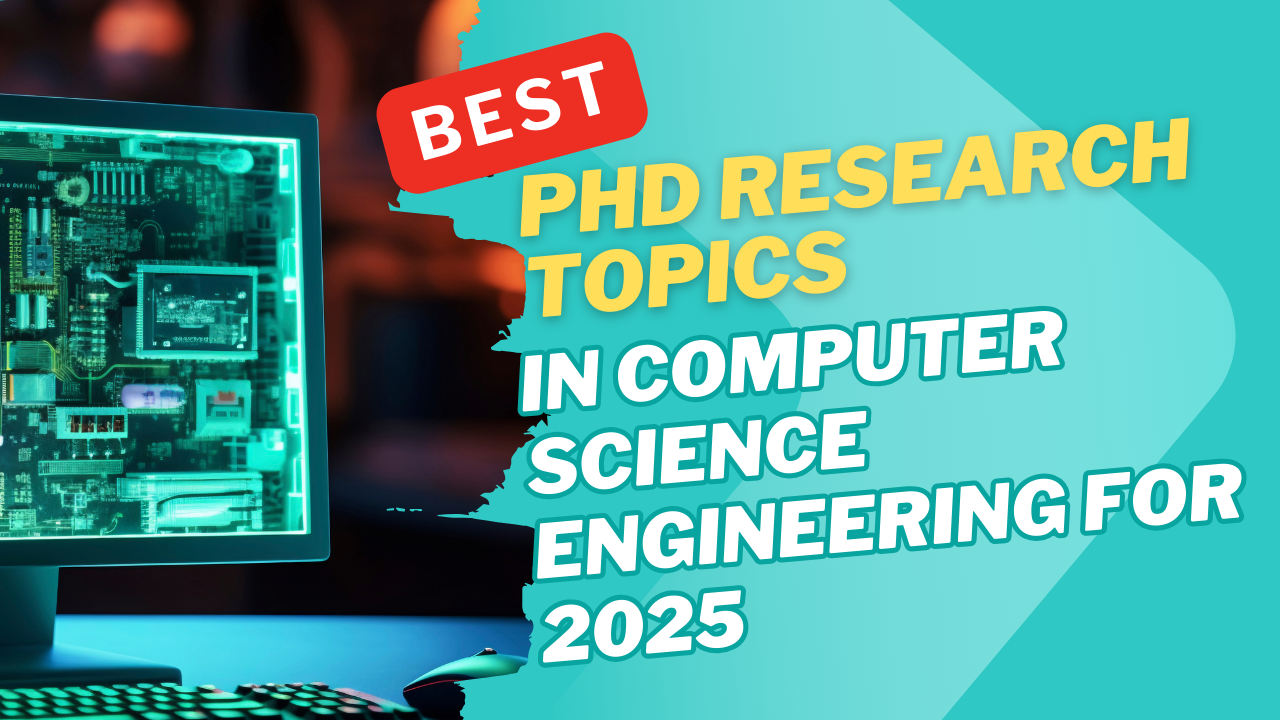Best PhD Research Topics in Computer Science Engineering for 2025
Kenfra Research - Shallo2025-02-17T16:48:26+05:30Are you searching for the most relevant and high-impact Topics in Computer Science Engineering for your PhD research? With technological advancements accelerating rapidly, research areas like artificial intelligence, cybersecurity, blockchain, IoT, big data, cloud computing, and quantum computing are gaining significant traction. Selecting the right Topics in Computer Science Engineering is vital for contributing to academia and solving real-world technological challenges.
In this blog, we delve into the top PhD research topics in Computer Science Engineering (CSE) that are expected to drive innovation and transformation in 2025 and beyond.

Top PhD Research Topics in Computer Science Engineering
Artificial Intelligence and Machine Learning
- Research on Explainable AI (XAI) and its applications in transparent decision-making systems to enhance reliability and trustworthiness.
- Development of AI-driven cybersecurity solutions for proactive threat detection, vulnerability assessment, and intrusion prevention.
- Optimization of deep learning architectures to improve the efficiency, accuracy, and scalability of neural networks.
- AI-powered healthcare innovations, including predictive disease diagnosis, automated medical imaging analysis, and personalized treatment plans.
- Adaptive learning models and AI-based personalized education systems to enhance e-learning and virtual classrooms.
Cybersecurity and Data Privacy
- The impact of quantum computing on modern cryptographic algorithms and potential post-quantum security solutions.
- Implementing privacy-preserving AI techniques, such as federated learning and homomorphic encryption, to enable secure data sharing.
- Blockchain-based security models to prevent cyber threats, ensure data integrity, and facilitate secure financial transactions.
- Advanced threat intelligence frameworks leveraging AI and machine learning for robust cybersecurity in IoT ecosystems.
- Development of deepfake detection mechanisms using AI to counter misinformation, identity fraud, and digital impersonation.
Blockchain and Decentralized Systems
- Smart contract security vulnerabilities and methods for improving contract auditing and verification.
- Decentralized identity management solutions for enhanced privacy and security in digital interactions.
- Risk mitigation and security frameworks for decentralized finance (DeFi) applications to prevent fraud and financial losses.
- Integration of blockchain and AI to optimize secure data processing and decentralized autonomous organizations (DAOs).
- Research on energy-efficient consensus mechanisms for sustainable blockchain solutions in reducing computational overhead.
Internet of Things (IoT)
- AI-powered predictive maintenance techniques for industrial IoT devices to reduce downtime and operational costs.
- Addressing security vulnerabilities in IoT networks through encryption, anomaly detection, and zero-trust architecture.
- Implementing edge computing solutions for real-time data processing in IoT applications, enhancing speed and efficiency.
- The role of digital twins in IoT-driven smart cities for optimized urban planning, resource management, and disaster response.
- Development of IoT-based healthcare monitoring systems for remote patient monitoring, emergency response, and elderly care.
Big Data and Cloud Computing
- Federated learning approaches for secure and privacy-compliant big data analytics in distributed environments.
- Optimization of AI-driven cloud computing models for large-scale applications with high computational efficiency.
- Development of energy-efficient and sustainable data centers for green cloud computing.
- Addressing security challenges and compliance risks in multi-cloud architectures and hybrid cloud solutions.
- AI-powered big data analysis techniques for real-time decision-making, fraud detection, and predictive analytics.
Quantum Computing
- Practical implementations of quantum algorithms for solving complex optimization problems in logistics and finance.
- Research on error correction techniques to enhance the stability and reliability of quantum computing applications.
- Advancements in quantum cryptography to secure communications against potential quantum cyber threats.
- Exploring quantum machine learning techniques and their applications in artificial intelligence and pattern recognition.
- Development of quantum cloud computing platforms to make quantum resources more accessible and scalable.
Human-Computer Interaction (HCI) and Virtual Reality
- Advancements in brain-computer interfaces for seamless interaction between humans and digital systems.
- AI-driven chatbots and virtual assistants for enhanced user experience and customer service automation.
- Innovations in augmented and virtual reality applications for immersive education, training, and simulation environments.
- Gesture recognition systems to improve the efficiency and accessibility of human-computer interactions.
- Ethical implications and challenges of AI-driven HCI systems in daily life and workplace environments.
Software Engineering and Automation
- AI-assisted software testing techniques to detect bugs, vulnerabilities, and security loopholes in codebases.
- Automating DevOps pipelines with AI-driven CI/CD tools for efficient software deployment and maintenance.
- Optimization of code performance using AI-based predictive analytics for software development lifecycle improvements.
- Enhancing secure coding practices through AI-driven static and dynamic vulnerability detection tools.
- Leveraging AI in software maintenance for legacy system migration, bug fixing, and automated refactoring.
Conclusion
Selecting a PhD research topic in Topics in Computer Science Engineering requires careful consideration of emerging trends, technological advancements, and real-world applications. The Topics in Computer Science Engineering discussed above present groundbreaking research opportunities in AI, cybersecurity, blockchain, IoT, cloud computing, quantum computing, and software engineering.
Kenfra Research understands the challenges faced by PhD scholars and offers tailored solutions to support your academic goals. From topic selection to advanced plagiarism checking.









Leave a Reply